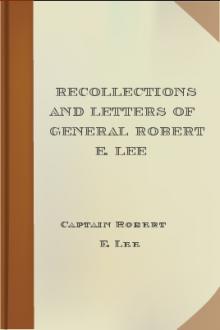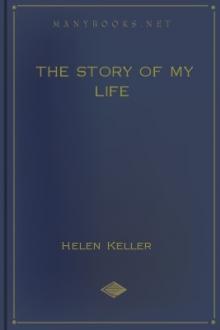Recollections and Letters of General Robert E. Lee by Captain Robert E. Lee (howl and other poems .txt) 📕

- Author: Captain Robert E. Lee
- Performer: -
Book online «Recollections and Letters of General Robert E. Lee by Captain Robert E. Lee (howl and other poems .txt) 📕». Author Captain Robert E. Lee
I am,
“Your most sincerely,
“R. E. Lee.”
On August 3d from the same place, he writes to my brother Fitzhugh: “…this was the day I had appointed to go to the Hot, but Mildred is too sick to move. She was taken more than a fortnight since,…and her attack seems to have partaken of a typhoid character. She has had since a low and persistent fever, which retains its hold. She is very feeble, but, in the doctor’s opinion, somewhat better. I myself see little change, except that she is now free from pain. I cannot speak of our future movements. I fear I shall have to abandon my visit to the White. Your mother and Agnes are better than when they arrived. The former bathes freely, eats generously, and sleeps sweetly. Agnes, though feeble, is stronger. I am the same, and can see no effects of the waters upon myself. Give much love to my sweet daughter and dear sons. All unite with me in this message….
I am, as ever and always,
“Your father,
“R. E. Lee.”
Another letter to my brother, Fitzhugh, from the Warm Springs, tells of his daughter’s convalescence. Smith’s Island, of which he writes, belonged to my grandfather’s estate, of which my father was executor.
He was trying to make some disposition of it, so that it might yield a revenue. It is situated on the Atlantic just east of Cape Charles, in Northampton County, Virginia.
“Warm Springs, Virginia, August 14, 1868.
“My Dear Fitzhugh: I received, yesterday, your letter of the 9th, and, as your mother informed you of Mildred’s condition, I deferred replying to it until to-day. I am glad to inform you that she is better, and that the doctor pronounces her convalescent this morning.
He says her progress must necessarily be slow, but with care and prudence he sees nothing to prevent her recovery, unless something unforeseen occurs. I hope, therefore, we may dismiss our anxiety. As regards Smith’s Island, I should be very glad if you could go over and see it, and, if you think proper, make such disposition of it as you and Robert think most advantageous. See Mr. Hamilton S. Neale (Eastville, Northampton County, Virginia) and consult with him on the subject and let me know your determination. I think you will find him kind and intelligent. I have visited the island twice in my life, a long while ago, and thought that, if a person lived on it, he might, by grazing, planting and fishing, make a comfortable living.
You and Robert might, if you choose, buy the island from the estate.
I fear the timber, etc., has been cut from it. I never thought it as valuable as your grandfather did. You will have to go to Norfolk, take the steamer to Cherrystone, where, I suppose, you can find a conveyance to Eastville. You know Cobb’s Island has been a fashionable bathing-place. John Lewis wrote that the beach was delightful and fare excellent, and that they had sail-vessels there at the disposal of visitors. But Mr. Neale and Mr. John Simpkins, the present agent, can put you in the way of visiting the island, and you might carry my sweet daughter, Tabb, over and give her a surf bath. But do not let the mosquitoes annoy her. Give her much love from me. I am writing in Mildred’s room, who is very grateful for your interest in her behalf. She is too weak to speak. I hope Rob had a pleasant trip. Tell me Custis’s plans. I have not heard from him. Your mother and Agnes unite in love to you, Rob, and Tabb. I have a fan in one hand, while I wield a pen with the other, so excuse brevity. Most affectionately yours, R. E. Lee.
“P.S.—George and Eleanor Goldsborough and Miss Mary G– express themselves as much pleased with Cobb’s Island. I do not know how far it is east of Smith’s Island. R. E. Lee.”
His daughter being convalescent, he carried out his plan, and went over to the White Sulphur Springs, after he had placed my mother and sisters at the Hot Springs. In a letter from there, on August 28th, he writes:
“…The place looks beautiful—the belles very handsome, and the beaux very happy. All are gay, and only I solitary. I am all alone. There was a grand fancy masked ball last night. The room was overflowing, the music good, as much spring in the boards as in the conversation, and the german continued till two o’clock this morning. I return to the Hot next week, and the following to Lexington. Mildred is much better, but says she has forgotten how to write. I hope that she will be strong enough to return with me…. I am, Truly and affectionately yours, R. E. Lee.”
They all returned to Lexington early in September, in time for the opening of the college. Mildred was still weak and nervous, nor did she recover her normal strength for several months. She was always my father’s pet as a little girl, and during this illness and convalescence he had been very tender with her, humoring as far as he could all of her fancies. Not long before that Christmas, she enumerated, just in fun, all the present she wished—a long list.
To her great surprise, when Christmas morning came she found each article at her place a the breakfast-table—not one omitted.
His sympathy with all who were suffering, ill, and afflicted was warm and sincere. Colonel Shipp, now superintendent of the Virginia Military Institute, was the commandant of cadets when my father came to Lexington. He tells me that the he was ill for some weeks, laid up in his room, which was next to that of my brother Custis. He hardly knew General Lee, and had spoken to him only a few times, but my father went to see him quite often, would sit by him, talk to him, and seemed much interested in his getting well. He said that he would consult Mrs. Lee (“who is a great doctor”), and he finally brought a bottle of something in which sudor-berries were the chief ingredient. Colonel Shipp found out afterward that the sudor-berries had been sent from the White House, and that my mother had concocted the medicine.
On one occasion, calling at Colonel Preston’s, he missed two little boys in the family circle, who were great favourites of his, and on asking for them he was told that they were confined to the nursery by croup. The next day, though the weather was of the worst description, he went trudging in great storm-boots back to their house, carrying in one hand a basket of pecan nuts and in the other a toy, which he left for his little sick friends.
To my mother, who was a great invalid from rheumatism for more than ten years, he was the most faithful attendant and tender nurse. Every want of hers that he could supply he anticipated. His considerate fore-thought saved her from much pain and trouble. During the war he constantly wrote to her, even when on the march and amidst the most pressing duties. Every summer of their life in Lexington he arranged that she should spend several months at one of the many medicinal springs in the neighbouring mountains, as much that she might be surrounded by new scenes and faces, as for the benefit of the waters.
Whenever he was in the room, the privilege of pushing her wheeled chair into the dining-room and out on the verandas or elsewhere about the house was yielded to him. He sat with her daily, entertaining her with accounts of what was doing in the college, and the news of the village, and would often read to her in the evening. For her his love and care never ceased, his gentleness and patience never ended.
This tenderness for the sick and helpless was developed in him when he was a mere lad. His mother was an invalid, and he was her constant nurse. In her last illness he mixed every dose of medicine she took, and was with her night and day. If he left the room, she kept her eyes on the door till he returned. He never left her but for a short time. After her death the health of their faithful servant, Nat, became very bad. My father, then just graduated from West Point, took him to the South, had the best medical advice, a comfortable room, and everything that could be done to restore him, and attended to him himself.
I can find few family letters written by my father at this time. Those which have been preserved are to my brother Fitzhugh, and are mostly about Smith’s Island and the settling up of my grandfather’s estate.
The last of September he writes:
“Lexington, Virginia, September 28, 1868.
“My Dear Fitzhugh: Your report of the condition of Smith’s Island corresponds with my own impressions, based upon my knowledge of the island and the reports of others. I think it would be advantageous, under present circumstances, to make sale of the island as soon as a fair price can be obtained, and I have so instructed Mr. Hamilton S.
Neale, who has consented to act as my agent…. I should like this while matter arranged as soon as possible, for my life is very uncertain, and its settlement now may avoid future difficulties. I am very glad to hear that you and Rob have continued well, and that my daughter is improving. Give my love to them both. The loss of your fine cows is a serious one, and I believe you will have to procure them in your vicinity and improve them. Get some calves this fall of a good breed. We hope that we shall see you this fall. Your mother is as comfortable as usual, and Mildred is improving. Custis, Mary, and Agnes are well, and all would send love, did they know I was writing.
“Very affectionately your father, R. E. Lee.”
This autumn he had a visit from his nephew, Edward Lee Childe. Edward lived in Paris, and had crossed over in the summer to see my father and mother. He made a very pleasant impression on everybody, and was much pleased with his visit. Here is a letter written by my father to my brother just after Edward left: “Lexington, Virginia, October 14, 1868.
“My Dear Fitzhugh: I have returned to Mr. Hamilton S. Neale the advertisement of the sale of Smith’s Island, with my approval, and have requested him to advertise in the Northern and Richmond papers, etc., and to send out such other notices as he deems best calculated to attract attention to the property, and to take every measure to enhance the value of the island and to procure for your grandfather’s estate the full benefit of the sale…. I have heard from Mr. Compton that my daughter Tabb has returned to the White House in improved health, which I am very glad of. I hope that you will soon be able to bring her up to see us. Do not wait until the weather becomes too cold. Our mountain atmosphere in winter is very harsh. So far, the weather has been delightful. Your cousin Edward left us last Thursday evening on his





Comments (0)